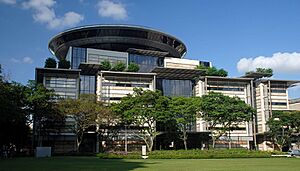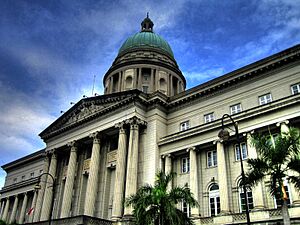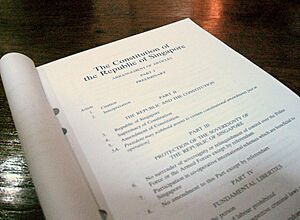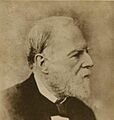High Court of Singapore facts for kids
Quick facts for kids High Court of Singapore |
|
|---|---|

The new Supreme Court Building was opened in 2005, designed by Norman Foster
|
|
| Established | 9 January 1970 |
| Composition method | Executive selection |
| Authorized by | Constitution of Singapore |
| Judge term length | Tenure until the age of 65, but may be re-appointed |
| Website | www.supremecourt.gov.sg |
| Chief Justice of Singapore | |
| Currently | Sundaresh Menon |
| Since | 6 November 2012 |
The High Court of Singapore is an important part of Singapore's legal system. It is the main court where many serious cases begin. It also hears appeals from less serious cases that started in other courts. The High Court is part of the Supreme Court of Singapore. The other part is the Court of Appeal, which handles appeals from the High Court.
The High Court includes the Chief Justice and other judges. Sometimes, special helpers called Judicial Commissioners are appointed. They help manage the many cases the Court handles. The High Court also has special courts for business matters. These include the Admiralty Court for sea-related cases and the Intellectual Property Court for ideas and inventions.
In 2015, the Singapore International Commercial Court was created. It is also a part of the High Court. The High Court has different sections, like the General Division, Appellate Division, and Family Division. The main building for the High Court is the Supreme Court Building.
The High Court can hear cases for the first time. This is called its original jurisdiction. It also hears appeals from lower courts, which is its appellate jurisdiction. A special power of the High Court is to check if laws or government actions follow the Constitution of Singapore. This is called judicial review. The Court also oversees and reviews decisions made by lower courts.
The High Court follows decisions made by the Court of Appeal. This is a rule called stare decisis, or judicial precedent. It means that once a higher court makes a decision, lower courts must follow it. In the same way, decisions by the High Court must be followed by District Courts and Magistrates' Courts. However, a High Court judge does not have to follow decisions made by other High Court judges. But usually, they do, unless there's a very good reason not to. If there are different decisions from High Court judges, the Court of Appeal decides which one is correct.
Contents
History of the High Court
How the Court System Began
In 1826, Singapore joined Malacca and Penang to form the Straits Settlements. A special court called the Court of Judicature was set up. This court could handle many types of cases, including civil and criminal matters. The judges of this early court included the Governor and a professional judge called the Recorder.
At first, the Governor could overrule the Recorder's decisions. This caused problems because the Recorder was the only trained judge. People wanted the government and the courts to be separate. This issue was fixed in 1867. From then on, the Governor and other government officials no longer acted as judges.
Changes Over the Years
In 1868, the Court of Judicature was replaced by the Supreme Court of the Straits Settlements. This Supreme Court was changed again in 1873. It then had a Chief Justice and several other judges. Singapore became the main center for government and trade. So, the Chief Justice usually lived in Singapore. The Supreme Court also gained the power to hear appeals.
More changes happened in 1907. The Supreme Court was split into two parts. One part handled new cases, and the other handled appeals.
During World War II and After
During the Japanese occupation of Singapore (1942–1945), new courts were set up by the Japanese. After World War II, the old British courts were brought back. They stayed mostly the same until Singapore became independent in 1965.
When Singapore joined Malaysia in 1963, its High Court became part of Malaysia's court system. But in 1965, Singapore became an independent country. The High Court remained part of the Malaysian system until 1969. Then, Singapore passed a law to create its own court system. On January 9, 1970, the Supreme Court of Singapore was officially formed. It included the Court of Appeal, the Court of Criminal Appeal, and the High Court.
For a long time, the highest appeals from Singapore could go to a court in the United Kingdom called the Judicial Committee of the Privy Council. But in 1994, Singapore set up its own permanent Court of Appeal for all types of cases. After that, appeals to the Privy Council were stopped completely.
How the High Court Works
Who Are the Judges?
The High Court is made up of the Chief Justice of Singapore and other Judges of the High Court. To become a judge, a person must have at least ten years of experience in law. The President of Singapore appoints judges. The President does this after getting advice from the Prime Minister. The Prime Minister also talks to the Chief Justice before advising the President.
Sometimes, people are appointed as Judicial Commissioners. They have the same powers as judges. However, they usually serve for a shorter time. Judges usually stay in their role until they are 65 years old.
How Cases Are Heard
Most cases in the High Court are heard by a single judge. If needed, a Judge from the Court of Appeal can also act as a High Court Judge. The Court can also ask experts to help with a case if their skills are needed.
The Chief Justice decides how cases are shared among the judges. In 2002, special courts were set up for business cases. This was to help Singapore become a top place for solving business disputes. The Admiralty Court handles shipping cases. The Intellectual Property Court deals with cases about inventions and creative works. Judges with special knowledge in these areas lead these courts.
The High Court is open almost every day, except Saturdays, Sundays, and public holidays. But a judge can work on these days if a case is very urgent. The High Court sits in the Supreme Court Building.
What Cases Does the High Court Handle?
The High Court handles both new cases and appeals.
Original Jurisdiction: Hearing New Cases
When the High Court has original jurisdiction, it means it can hear cases for the very first time. It can handle almost any type of civil or criminal case, no matter how big or small.
However, if a case is not very serious, it should usually start in a lower court. If someone brings a small case to the High Court, they might have to pay more legal fees. For example, a Magistrate's Court can hear civil cases where the amount of money involved is up to S$60,000. If a person starts a case in the High Court for less than S$60,000, they might not get back all their legal costs from the other side.
Generally, civil cases must start in the High Court if the amount of money involved is more than S$250,000. For cases about a deceased person's property (probate matters), they go to the High Court only if the property is worth more than S$3 million.
Lower courts, like the District Court, handle many criminal cases. For example, they can try cases where the maximum jail time is ten years or less. So, these cases usually don't go to the High Court first.
Civil Cases the High Court Hears
The High Court can hear civil cases that involve a specific person. This happens if the person is officially told about the case, or if they agree to let the Court handle it.
The High Court has special powers for certain types of civil cases:
- Cases about divorce and family matters.
- Cases about shipping and sea law.
- Cases about bankruptcy or companies.
- Cases about appointing and overseeing guardians for children and people with mental conditions.
- Cases about approving wills and managing the property of people who have passed away.
The High Court also shares some powers with the Syariah Court of Singapore. The Syariah Court handles family law for Muslims. The High Court can hear certain cases about family support, child care, or property division in a divorce, if specific conditions are met.
Some family cases that used to be in the High Court were moved to a special Family Court in 1996. The Family Court handles divorces, property division, and child care. However, if a divorce case involves a lot of money (over S$1.5 million), it goes back to the High Court. Decisions from the Family Court can be appealed to the High Court.
How Civil Trials Work
In most civil trials, the person bringing the case (the plaintiff) starts by explaining their case. After they show all their evidence, the other person (the defendant) decides if they want to show evidence too. If the defendant chooses not to, the plaintiff gives a final speech. Then the defendant gives their final speech.
If the defendant decides to show evidence, they explain their case first. Then they show their evidence and give a final speech. The plaintiff can then give a speech in response. If anyone brings up a new legal point or uses a new legal example in their final speech, the other side can respond to that.
Judicial Review: Checking Laws and Actions
A very important power of the High Court is judicial review. This means the Court can check if laws or government actions follow the Constitution of Singapore. The Constitution is the highest law in Singapore. Any new law that goes against the Constitution is not valid.
The High Court has the power and duty to make sure the Constitution is followed. It can declare any law or government action invalid if it goes beyond what the Constitution allows. This idea comes from a famous case in the United States called Marbury v. Madison (1803). The Singapore High Court confirmed this power in a 1994 case, saying:
The court has the power and duty to ensure that the provisions of the Constitution are observed. The court also has a duty to declare invalid any exercise of power, legislative and executive, which exceeds the limits of the power conferred by the Constitution, or which contravenes any prohibition which the Constitution provides.
If a legal question about the Constitution comes up in a criminal case, a party can ask for the question to be sent to a "relevant court" for a decision. If the case is in a lower court, the High Court is the "relevant court." If the case is already in the High Court, the Court of Appeal is the "relevant court."
High Court Powers
The High Court has many powers given to it by law. For example, it can:
- Order that evidence be kept safe, like by taking photos or samples.
- Move any case to another court, or to or from a lower court.
- Order a medical check-up for someone in a case if their health is important to the matter.
The High Court can also move a criminal case from a lower court to another court or to itself. This happens if it seems that:
- A fair trial cannot happen in the lower court.
- A difficult legal question is likely to come up.
- It is needed for justice or by other laws.
Appellate Jurisdiction: Hearing Appeals
When the High Court uses its appellate jurisdiction, it hears appeals from lower courts. These include District Courts, Magistrates' Courts, and other special tribunals.
For some appeals from District Courts or Magistrates' Courts, permission is needed. This is true if the amount of money in the case is S$50,000 or less. These appeals are usually heard by one judge. But if the judge thinks it's necessary, three judges can hear the appeal. The decision is then made by the majority of the judges.
If the High Court agrees with the lower court's decision, it will reject the appeal. If it disagrees, it will allow the appeal and change the lower court's decision.
When hearing an appeal, the High Court looks at the case again. It is not bound by the lower court's decision. However, witnesses do not come back to testify again. Instead, the Court looks at the notes taken by the judge in the first trial or the full written record of the proceedings. It also listens to the legal arguments from the lawyers.
Supervisory and Revisionary Powers
The High Court also oversees and reviews what happens in all lower courts.
Supervisory Power
The High Court has a general power to oversee lower courts. If justice seems to require it, the Court can ask for the records of any case in a lower court at any stage. It can then order the case to be moved to the High Court. Or it can give directions to the lower court on how to handle the case.
One important part of this power is to review decisions made by government agencies and officials. This power comes from old English courts. The High Court can issue special orders to make sure rights are enforced or for other purposes. These orders include:
- A mandatory order (telling someone to do something).
- A prohibiting order (telling someone not to do something).
- A quashing order (canceling a decision).
- An order for review of detention (checking if someone is being held legally).
When reviewing government actions, the High Court's main job is to make sure the decision was made according to the law. Even if the Court disagrees with a decision, it usually won't replace it with its own decision.
Revisionary Power
The High Court can also look at the records of any civil case in a lower court. It does this to make sure the decision was correct and proper. After looking at the records, the Court can give orders, like asking for a new trial. This is to make sure justice is done. The Court can do this on its own or if someone asks. But it won't do it if the person could have appealed the decision but didn't.
The High Court can also review criminal cases in lower courts. It can tell a magistrate to look into a case again if a complaint was dismissed. It can also use powers similar to those used in an appeal, like changing a sentence. However, the Court cannot change a finding of "not guilty" to "guilty" when using its revisionary power.
When the High Court reviews a case, it decides whether to hear from the parties involved. No one has a right to be heard. But if the Court plans to make an order that harms someone, that person must first be given a chance to speak up. After the High Court reviews a case, it sends its decision back to the trial court. The trial court then makes any further orders needed to follow the High Court's decision.
Judicial Precedent: Following Past Decisions
The High Court must follow decisions made by the Court of Appeal. This is called stare decisis, or judicial precedent. It means if the Court of Appeal has already decided on a similar legal issue, the High Court must apply that decision. This is true even if the High Court thinks the decision was wrong or unfair.
In the same way, decisions made by the High Court are binding on lower courts. This means District Courts and Magistrates' Courts must follow the High Court's decisions.
However, a High Court judge does not have to follow decisions made by other High Court judges. But usually, judges will not go against a previous decision unless there is a very good reason. This is especially true if the decision has been in place for a long time. If there are different decisions from different High Court judges, it is up to the Court of Appeal to decide which decision is the correct one.
Images for kids
See also
- Judicial system of Singapore
- Supreme Court of Singapore
- Court of Appeal of Singapore
- State Courts of Singapore
- Family Justice Courts
- Law of Singapore
- Judicial officers of the Republic of Singapore
- Lawyers in Singapore




